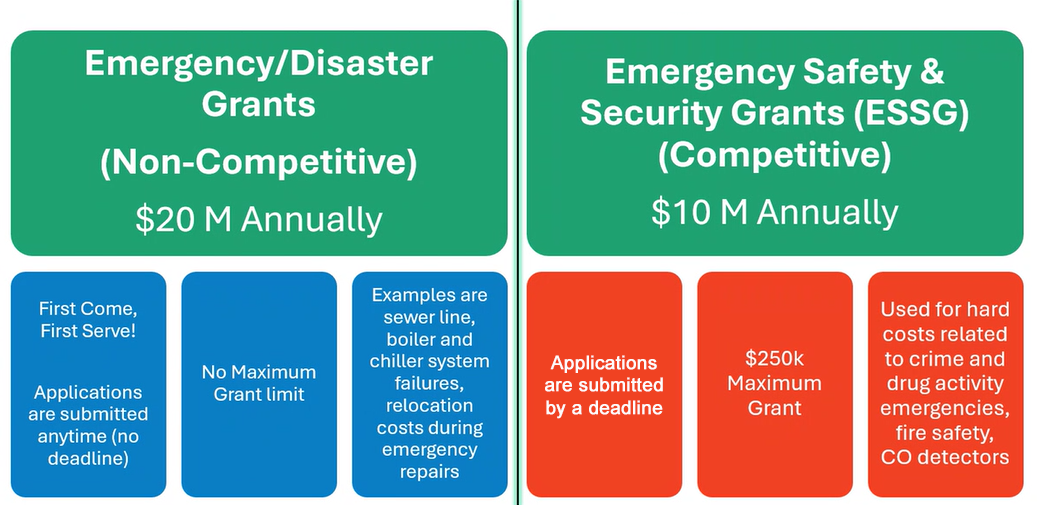Each year, funds within the Public Housing Fund appropriation are set aside to fund emergencies and natural disasters, specifically to address needs resulting from unforeseen or unpreventable emergencies and natural disasters, excluding Presidentially Declared disasters, occurring in the current fiscal year. Within the set-aside, Congress may appropriate specific funding to provide assistance to PHAs for emergency capital needs for safety and security, including measures necessary to address crime and drug-related activity. Effective with PIH Notice 2019-22, the Department included the threat of carbon monoxide poisoning as a potential emergency safety need for public housing residents. With PIH Notice 2023-10, the current ESSG notice, HUD added the threat of fires as a potential emergency safety need for public housing residents. PIH Notice 2023-10 is the current Safety and Security Notice. With the FAQs for FY2024 ESSG Application Process (Updated March 13, 2024) HUD added life threatening conditions under NSPIRE as potential emergency safety needs for public housing residents. Please see the FAQ for a list of life threatening conditions under NSPIRE.
A “safety and security emergency” is defined as an emergency that may arise from:
1) an immediate need for funding by the PHA to implement safety and security measures necessary to address crime and drug-related activity; or
2) a safety emergency which requires the purchase, repair, replacement, or installation of carbon monoxide alarms/detectors, and or smoke/heat alarms/detectors.
3) a safety emergency resulting from life threatening conditions to public housing under NSPIRE. Please see the ESSG FAQ for a list of life threatening condoms under NSPIRE.
To apply for an Emergency and Safety and Security Grants (ESSG), please visit the ESSG website for announcement related to FY2025 funding availability.
The Emergency Safety and Security grant funds are available to address safety and security needs that threaten the health and safety of the public housing residents. The crime or drug-related activity or the safety emergency requiring carbon monoxide detectors, either of which has given rise to the need for safety and security funding, must have existed prior to submission of the application.
The safety and security emergency must occur within the Federal Fiscal Year (October 1 — September 30) in which the funds were appropriated.
HUD is Now Accepting Applications through March 27, 2025, at 5:00 pm (EDT). Webinar was be held on Wednesday January 29, 2025, at 2:00 pm (EST).
Application period has closed for ESSG Funding on March 27, 2024. Below are list of Awards by Public Housing Agency and guidance on submitting applications.
- List of Awards by Public Housing Agency (PHA)
- FAQs for FY2024 ESSG Application Process (Updated March 13, 2024)
- ESSG Application Process Webinar Part 2 (YouTube Video) [March 6, 2024]
- View ESSG Application Process Webinar (YouTube Video) [February 1, 2024]
- View Presentation Slides (February 2024) >>
- Notice of Due Date for Submission of FY24 Capital Fund Emergency Safety and Security Application
- Notice PIH 2023-10 Emergency Safety and Security Grants Annual Funding Notification and Application Process - Amended 6/14/2023
- Notice of Due Date for Submission of FY23 Capital Fund Emergency Safety and Security Application
- Notice of Due Date for Submission of FY22 Capital Fund Emergency Safety and Security Application Annual Funding Notification and Application Process – Due June 15, 2022
- Notice of Due Date for Submission of FY19 Capital Fund Emergency Safety and Security Applications for Carbon Monoxide Detectors Only: Due Friday, October 25, 2019
- FY 2019 Safety and Security Applications Due Wednesday, June 5, 2019; PHA Notification
- FY 2018 Safety and Security Applications Due Monday, June 4, 2018; PHA Notification
- Emergency Safety and Security Funding FAQ as of 3/1/2015
- Emergency Safety and Security Funding as it Relates to the Department of Defense and Full-Year Continuing Appropriations Act, 2011 [Public Law 112-10]
- Emergency Safety and Security Funding FAQ as of 10/17/2011
- FY11 Emergency Safety and Security Grants Announcement of Funding Awards Federal Register
The Emergency Safety & Security Grants (ESSG) program is sometimes confused with the Emergency and Natural Disaster Funding program. The funding for each program targets different types of "emergency capital needs". A brief comparison of the two programs can be found below.
You are viewing ESSG Website. Please visit Emergency and National Disaster Website for more information on this grant program.
Emergency Safety and Security Grants

HUDPIH-516391410-394(395) Last Updated 1/16/2025
- FY24 List of Awards by Public Housing Agency (PHA)
- FY 2023 HUD Awards $10 Million to Public Housing Agencies for Safety and Security Needs
- FY 2022 Nearly $10.4 Million to Public Housing Agencies for Safety and Security Needs
- FY 2021 Emergency Safety and Security Grant Awards
- FY 2020 (and FY 2019 Carryover) Emergency Safety and Security Grant Awards - HUD Awards $13.7 Million to Public Housing Agencies for Emergency Safety and Security Improvements
- FY 2019 Emergency Safety and Security Grant Awards - Carbon Monoxide
- FY 2019 Emergency Safety and Security Grant Awards
- FY 2018 Emergency Safety and Security Grant Awards
- FY 2015 HUD AWARDS $6 MILLION TO 29 PUBLIC HOUSING AGENCIES TO SUPPORT EMERGENCY, SAFETY AND SECURITY NEEDS
- FY 2014 HUD Awards $3 Million to 13 Public Housing Agencies to support Emergency, Safety and Security
- 2010 Emergency Safety and Security Grant Awards
- 2009 Emergency Safety and Security Grant Awards
Emergency Safety and Security Grants Annual Funding Notification and Application Process Notices
- PIH Notice 2023-10
- PIH Notice 2022-05
- PIH Notice 2020-25
- PIH Notice 2019-22
- PIH Notice 2016-03
- Notice PIH 2014-09
Emergency Safety and Security Funding as it Relates to the Full-Year Continuing Appropriations Act
Emergency Safety and Security Funding as it Relates to the Omnibus Appropriations Act
- Log in to post comments